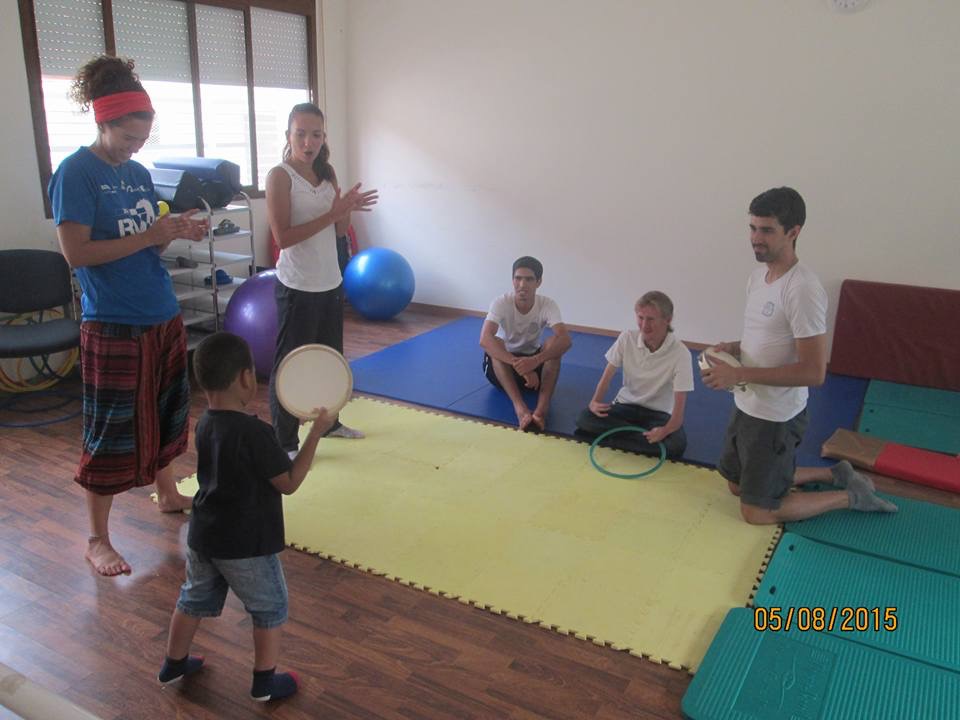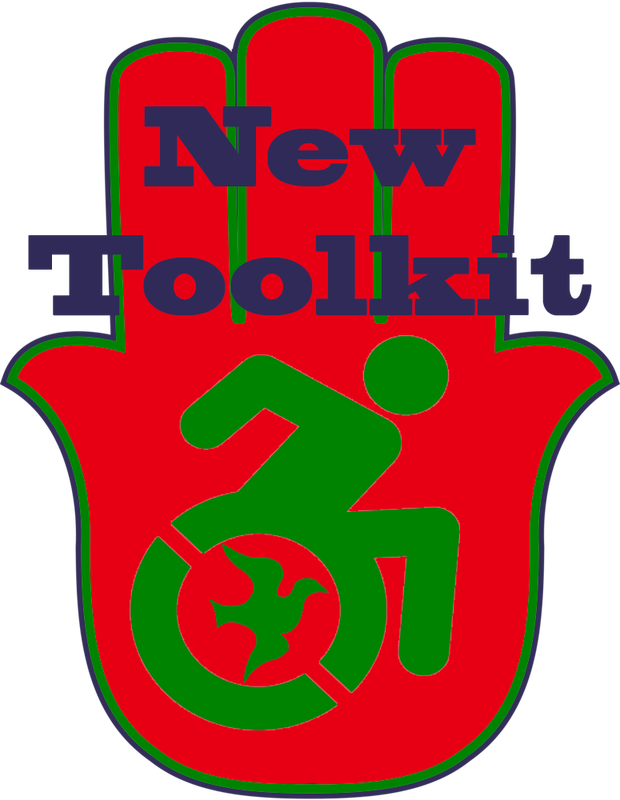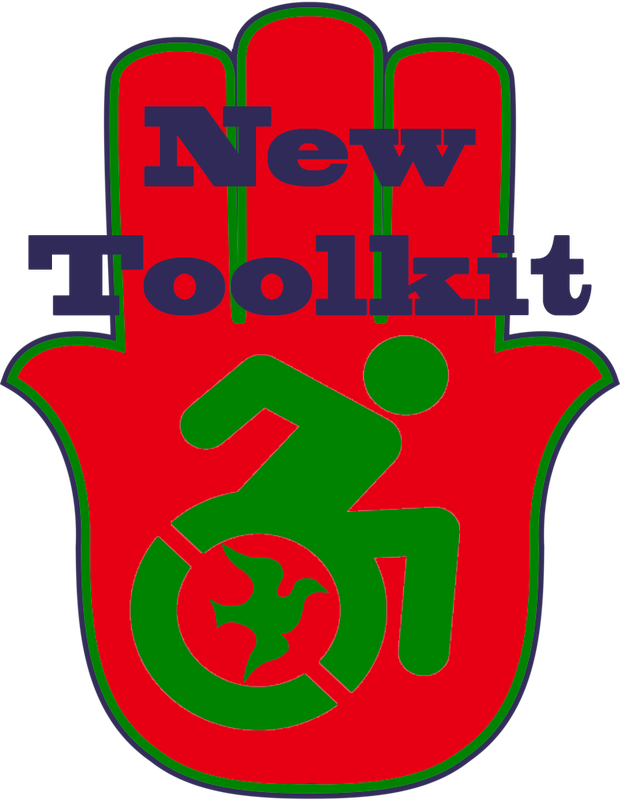|
هل يمكن أن تقدم نفسك بخلاصة؟
Could you briefly introduce yourself? السلام عليكم انا المهدي الومغاري مغربي في وضعية اعاقة ابلغ من العمر 27 سنة Hello! I’m El Mehdi Mrhari, and I am a Moroccan. I'm 27 years old and I have a disability. أخبرني عن مسيرتك التعليمية؟ Tell me about your educational career. تمكنت و الحمد لله من الحصول على شهادة الباكالوريا علوم رياضية و من ثم توجهت الى شعبة الاقتصاد التي تلائم اكثر قدراتي الصحية عبر المدرسة الوطنية لتجارة و التسيير و كان لي شرف ان اصبح من خريجيها و الان احضر الدكتوراة في المالية تحت اشراف المعهد العالي للتجارة وإدارة المقاولات. I got a Baccalaureate of Mathematical Sciences. Then I headed to study Economy at the National School of Trade and Management which suited my health abilities, and I had honor to be one of its graduates. Now I am preparing my Doctorate in Finance Studies under the supervisor of ISCAE (Higher Institute of Trade and Management). ماذا كانت حياتك العملية او المهنية بعد الدراسة؟ What was your work life like after school? حاليا انا موظف بالقطاع الحكومي Currently, I am working in the government sector. كيف ترى نفسك في المستقبل؟ What do you see for yourself in the future? افضل طريقة لتنبأ بالمستقبل هي ان نصنعه. أتمنى أن ألتحق عما قريب بالجامعة و أن أشتغل في ميدان البحث العلمي و لأ اخفيكم ان العمل الجمعوي و كتابة الخواطر يستهويانني The best way to predict the future is to make it. I hope to join the university soon and to work in the field of scientific research. I also like voluntary work and writing. كيف يمكنك التغلب على التحديات التي تواجهك خلال تعايشك مع الإعاقة ؟ How have you overcome the challenges that come with living with a disability? الحمد لله حققت ما تأتى لي ان احقق بفضل المساندة الدائمة للأسرة . خاصة في ظل ضعف مواكبة الدولة للمعاق المغربي دون ان انسى دور بعض الاطر التعلمية في تكويني و صقل اخلاقي و كدلك التزامي بثقافة الواجب ساعدني على النجاح I became what I am now thanks to God and the permanent support of family, especially in light of the weaknesses of the government towards Moroccan with disabilities, without forgetting the role of educators who helped me to become who I am today and reshape my personality. هل لديك أي نصيحة للأشخاص الذين يعيشون وضعية الإعاقة التي ترغب أن تحسن حياتهم من خلالها؟ Do you have any advice for people who are living with a disability and want to improve their lives? يجب على دوي الاحتياجات الخاصة ان يعوا ان لهم دور مهم و جوهري في توازن هدا العالم و في تنمية بلدانهم و ان لا يستهينوا بقدراتهم. لا تتركوا اليأس ان يستوطن عقولكم لابد ات تتحلوا بثقافة الواجب لكي تنجحوا فالنجاح ممكن I think that people with special needs should be aware that they have an important role in the balance of this world and the development of their communities. They should not underestimate their abilities. Do not let despair overwhelm you. To succeed you need to believe that everyone has duties and success is possible. Translation by Mostafa Essalai and Mounia Ait Allal
2 Comments
How did working with SPSN Committee and the special needs community in Morocco affect your service? I appreciated my time working with the committee because I felt like it was a good opportunity to collaborate with others while working for common goals. I appreciated working with the people with special needs in my community because it was something that the people in my community needed and wanted so it was nice to be able to assist the community in fulfilling a need and providing activities and a positive atmosphere for this population and their families.
Share a favorite memory about your work with SPSN over the course of your service. I enjoyed working collaboratively with the "ramp it up" toolkit. I am hopeful that this can be a useful resource to present to future volunteers and their communities. Accessibility ramps are a great need in Morocco (and everywhere) and I hope we can assist in making buildings more accessible to the entire population. What's next for you after Peace Corps? I am still working on figuring out my plan but I hope to go on more adventures and never stop learning and exploring. What is something about your service you will take with you forever? I will never forget the hospitality and kindness I have encountered from Moroccans at various times throughout my service. Where and when did the activity/project take place? A new association for youth with special needs.
How long was the project? A weekend and some follow up days How many participants? 3 PCVs, 2 counter parts, 2 teachers, 6 students What sort of need did you/your counterpart(s) identify and what sort of training or activity/activities did you do in response to that need? We fulfilled community growth and bonding with the community in our project. Will there be a continuation of the project (follow-up, annual meetings or trainings, future projects related to this project? Not necessarily. However, the teachers and counterparts have been taught how to create simple mural pieces, painting techniques, and there will be some more paintings added by the counterpart. What was your interest and/or goal(s) for the project? To start working with the developing association and build a stronger bond between them and Peace Corps. I began teaching English classes to the women and some students there. I also, after discussing a garden project with Anthony to work on with the association, brought some seeds to make a garden. They are currently in touch with Anthony and Hakim at Peace Corps Morocco and we will work towards linking them with larger organizations and funding. Would you deem this project/activity a success? What lessons did you learn, success stories, things you might do differently. Absolutely. Originally I was asked to paint one room for the association and therefore I was able to draw out the murals ahead of time. However, when I showed up with Kinsey, there were many students and a request for a second room to be painted on the spot. My mind went from painting a mural (zoning-out) mode to organizing the completion of a mural (managing). I was a little shocked at first but luckily I had a great counterpart, Ahmed, to help me communicate and organize a productive way to include students and teachers. Some participants stayed with me in the first room as I demonstrated how to catch an appropriate amount of paint on the brushes and mix colors. Ahmed worked with the other participants to free draw on the walls and paint. We went back over everything afterwards to touch it up. In the future I think I would work with a counterpart from the very first meeting and determine how many gloves and other supplies that we would need. Perhaps I would also do a demonstration with all the participants on how to paint and brainstorm on a mural that they would like to see so that I may better assist them in creating a matching theme (the second room had less of a flow, but it really adds to the charm and quaintness of the association). Could this project be replicated elsewhere? Advice for future projects like yours. Absolutely. Look into your sites resources, most have droogeries (hardware/paint shops), the amount of participants interested so that there are enough supplies for everyone, and collaborate with artistic/driven counterparts to create a fun mural. Make sure that you are clear with the association about what is expected of you and be upfront about your capabilities. The more that they want to join in, the better--so perhaps painting can be done in shifts depending on the space. Anything else you might want to add or include. It is really nice to have other knowledgeable and flexible volunteers supporting the project. Have a plan/layout, but have fun with it! Community art is a great way to bring communities together. 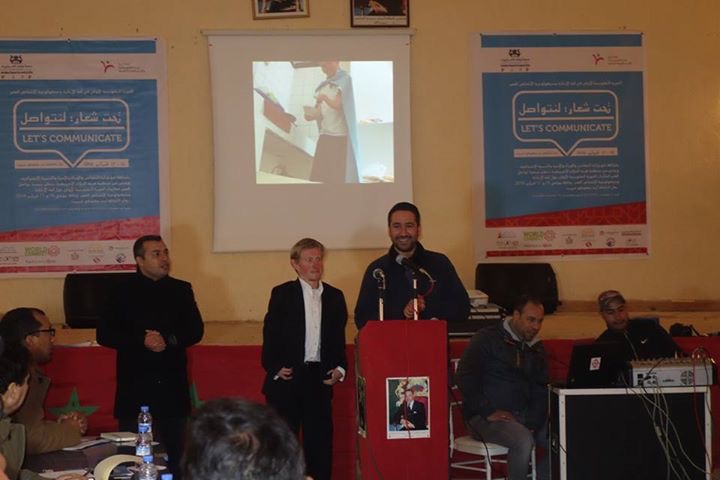 My name is Tom Hannam and I am a Peace Corps Volunteer based in Azrou, Morocco. My primary work is at a school for kids with special needs. I work there 4 days a week, Monday through Thursday. I teach English to two classes of kids for about 1 to 1.5 hours in the mornings from 10:30am to 11:30 or 12:00pm. On Monday’s and Wednesday’s I have my large beginners level class where much of the time is spent coloring pictures and working on worksheets I printed off from the internet. We first went over the Alphabet, spent time going over each letter including making the sounds they make and also learning how to write each letter, in both upper and lower cases. Many of the kids need practice with simple motor skills so the letters and also numbers are a great source of practice for them. I walk around the room and assist them when needed. Later subjects included shapes, colors, and animals. The beginners level class size varies but on average is about 8-10 kids. My other class, the intermediate level, I have only two students and they are able to fully read and write. One student has a hearing impaired situation while the other may be somewhat of a neurological issue. With these two students I have used the Peace Corps Dareja textbook and just taught it backwards. We began with greetings and have since moved on to family members, locations around town, simple past and present tense verbs and now days of the week. The center is open nearly the same time as the general schools with having 2 months or more off during the summer. During this large break, the center invites a team of Spanish medical volunteer students to perform a physical therapy clinic for 6-8 weeks every year. I volunteered my time and assisted in simple tasks with the Spanish volunteers. I helped out with most of the non-medical treatments such as helping the kids play simple games with a ball or playing matching games and other puzzle work. Last month I was invited and took part in a Teaching of Teachers (ToT) program in Mrirt about hearing impaired and deaf communities of Mirirt and across Morocco. We learned simple words and phrases in both Moroccan and French sign. The kids and parents seemed very grateful at our attempts to educate ourselves on the issue and to teach others in the future. It was a great experience to be apart of. In May, I plan to participate in the Moroccan Special Olympics that are being held in Ifrane. I look forward to that adventure as well. I have learned a lot from these kids and hope to continue working with them for the rest of my service. Noa Harris PCV-Tinjedad
Where and when does your activity/project take place? My activity takes place in my site, Tinjedad. I hold a class of seven mother’s and their children, four boys and three girls. The children all have a range of different mental disabilities. They are ages 4-9. My class takes place in the dar taqafa (cultural center) every Wednesday from 9:30-10:30. How long has your activity been going on? I started the weekly class at the end of November. Was the project in collaboration with another association or organization? No, I work solely with the women and their children. How many participants? Seven children, 7 mothers, and myself. What is the goal of your activity? The goal is that since there is no official educational facility for children with disabilities, particularly mental disabilities, the children were often kept inside at home all of the time. I wanted to offer a safe space for both the mother’s and the children. My class became both a support group for the mother’s and place to exchange information like one mother was unaware that she could receive aid from the government for her child. Additionally, it became a place for mothers to have a positive experience with their kids and learn to play with them and a place for the kids to have respect in a safe and structured environment. Since kids with mental disabilities need a very clear routine and structure so they know what to expect every class, we do the same structure every class. We start with some small exercises where we all sit in a circle and the children do exercises and activities with their moms face to face. Then we do an art activity or learn math. We have been learning numbers. When we learned the number one, the kids and mothers were asked to pick up one of many things (sticks, stones, flowers) from outside. When we learned the number two I gave them a picture of two elephants and we drew pictures of them. The most important thing is to allow the children to use all of their motor skills—audio, visual, and sensation learning. Another activity I did was I brought different pieces of wood. We used the pieces to build a tower of three, exemplifying the number three. We then built a big tower and we glued different pieces of wood together. After math we play games. Once we did ring around the rosy, once I brought recycled bottles and we filled it up with sand and we did bowling, another time we did head shoulders knees and toes, and we always finish by doing a cheer all together. It is very important to keep a routine of the setting and repeat things week after week. When it all came about and I proposed the idea to the mudira (director) of the dar taqafa she said I could open the facility for them on Sunday’s. The mudira made it seem as though she didn’t want the activity to be in conjunction with any other activity with children without disabilities. She wanted my class to be hidden from the community. However, this did not work with my Peace Corps schedule because Monday is our weekend so we made a compromise. We agreed to do the class early in the morning on Wednesday’s. This way, we would not have any scheduling problems, but the children and their mothers could still be given an equal opportunity to use the space.
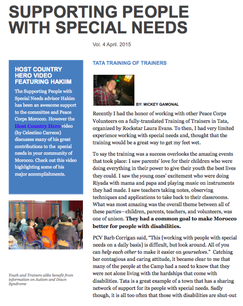 Fresh off the press! The Supporting People with Special Needs newsletter is now out and ready to be read. For all current PCVs in Morocco check your inbox for everyone else see below. Click here to read Vol. 4
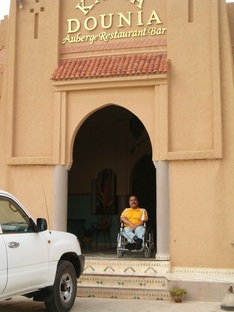 Hakim show casing the inaccessibility of many buildings Hakim show casing the inaccessibility of many buildings and fascinating, and such an important part of the amazing person he is, that we struggled with how to pare it down to only a few snippets of information. If this video intrigued you about Hakim’s life and work, we hope you will enjoy reading about everything that we couldn’t include in such a short clip. Hakim Illi was born in February, 1961, in Marrakech. His mother was a housewife and his father worked as a security guard in a factory. When Hakim was about 13 months old, he contracted polio. At the beginning his family worked very hard to find a cure; they were not yet ready to believe that they had a son with a disability. His mother became a huge advocate for her son, and she worked tirelessly taking him to doctors and learning about various medicines and treatments. When Hakim was 6 years old, his family finally learned and accepted that his polio would not be treatable, and they began looking for educational opportunities for him.
|
